Some critics view aircraft carriers as expensive “white elephants,” questioning their relevance in modern defence and highlighting their substantial costs.
In an age of cyber threats, asymmetric warfare, and advanced missile technology, some argue that these vast ships may be vulnerable or even unnecessary. Yet, for the United Kingdom, aircraft carriers remain essential, I’ll explain why.
This article is the opinion of the author and not necessarily that of the UK Defence Journal. If you would like to submit your own article on this topic or any other, please see our submission guidelines.
Far from being outdated, these formidable vessels are a cornerstone of Britain’s defence strategy and its influence on the global stage. Aircraft carriers offer unmatched mobility and operational flexibility, enabling the projection of power across vast distances without reliance on foreign bases.
They are tools of diplomacy, showcasing resolve, strengthening international partnerships, and safeguarding the UK’s economic and security interests.
The Basics
At their core, aircraft carriers are unmatched for their versatility. These vast ships, with their full-length flight decks, essentially function as mobile airbases capable of deploying fighter jets and helicopters wherever needed. This mobility provides a distinct advantage: the ability to operate in international waters, close to areas of interest or conflict, without requiring diplomatic permissions for airspace or basing rights.
The Royal Navy’s two aircraft carriers—HMS Queen Elizabeth and HMS Prince of Wales—bring this flexibility to life. Both are designed to operate F-35B Lightning II stealth jets, giving Britain a cutting-edge capability for precision strikes, reconnaissance, and air superiority missions. Their ability to launch and recover aircraft quickly from anywhere at sea makes them indispensable in crises.
But their significance extends beyond combat. These ships can also carry helicopters and deliver humanitarian aid, host medical facilities, and act as command centres for joint operations. Whether it’s disaster relief or combat operations, an aircraft carrier’s adaptability makes it a versatile asset for Britain’s defence and foreign policy.
Securing Economic Lifelines
Maritime trade is the lifeblood of Britain’s economy. With 90% of the world’s goods transported by sea, the stability of major shipping lanes is critical for economic prosperity. Aircraft carriers, as the centrepiece of Carrier Strike Groups (CSGs), provide the muscle to ensure that vital sea lines of communication remain open and secure from threats, whether they come from hostile states or non-state actors.
Britain’s global interests are particularly vulnerable in key chokepoints like the Strait of Hormuz, where disputes over freedom of navigation frequently arise. A carrier at sea is a reassurance to allies and a signal to adversaries that Britain has the capability—and the will—to protect its interests.
For the UK, whose economy depends on uninterrupted trade routes, the presence of a carrier isn’t just a matter of national pride—it’s a practical necessity. In regions where disruptions to maritime traffic could ripple through global markets, Britain’s carriers stand ready to safeguard economic stability.
A Diplomatic Tool and Strategic Deterrent
The 1972 deployment of HMS Ark Royal to Belize is a textbook example of how aircraft carriers balance diplomacy and defence to deliver strategic impact. At the time, tensions were running high between Belize and Guatemala, with the latter claiming the British colony. Belize, with its modest defence capabilities, faced a serious threat from its far larger neighbour.
The UK’s response was to send Ark Royal, then the pride of the Royal Navy, to the region. The carrier’s arrival sent a clear and immediate message: Britain would stand by Belize and was prepared to defend its interests. With its complement of aircraft, including Phantoms and Buccaneers, Ark Royal represented a level of firepower Guatemala could not hope to counter. Its very presence effectively deterred any plans of aggression, proving how carriers act as both a shield and a statement of intent.
But Ark Royal wasn’t just flexing muscle, the deployment also had a strong diplomatic element. By supporting Belize’s limited defence forces and engaging in regional cooperation, the carrier showcased Britain’s commitment to stability in the Caribbean.
It was a clear demonstration of the UK’s ability to project power and influence far from home without firing a shot, and the cost of the carrier was very low compared to the cost in treasure and blood of conflict.
HMS Ark Royal’s mission in Belize shows why aircraft carriers remain so relevant. They’re versatile tools of diplomacy, capable of preventing conflicts while strengthening alliances. It’s a reminder of the unique role carriers play in safeguarding Britain’s interests on the global stage.
Operational Independence
One of the most compelling strengths of an aircraft carrier lies in its unparalleled independence and operational flexibility. Unlike land-based airfields, which require permission from host nations and are often tied to complex diplomatic negotiations, carriers bring the advantage of mobility and autonomy. They are essentially floating cities, equipped with all the essentials to sustain extended deployments—fuel, food, spare parts, ordnance, and even advanced medical facilities. This self-sufficiency allows them to remain on station for weeks or even months, responding to crises without reliance on external support.
This independence translates into rapid response capability. Britain’s carriers can be deployed quickly to areas of need, bypassing the logistical and political hurdles that often accompany the use of foreign airfields. In times of tension, this means that a carrier can be positioned to de-escalate a situation or enforce international norms, such as no-fly zones or maritime blockades, without waiting for diplomatic approvals.
Perhaps even more significant is the reach these vessels provide. With the majority of the world’s population living near coastlines, carriers serve as platforms for projecting power into critical regions. They enable Britain to deliver air power directly from the sea, ensuring that geography is no obstacle to the nation’s ability to act decisively.
Whether providing humanitarian relief in the wake of natural disasters, enforcing international law in contested waters, or carrying out precision strikes in conflict zones, a carrier brings a level of adaptability that few other assets can match.
Challenges and Investments
Operating aircraft carriers is no small feat. These ships rank among the most expensive assets in any navy’s arsenal, demanding vast resources for construction, maintenance, and the intensive training required to operate them effectively. However, the benefits they deliver justify the significant investment, offering unmatched flexibility, reach, and strategic value.
As Ray Mabus, former US Secretary of the Navy, famously noted, “They get there sooner, stay there longer, bring everything they need, and don’t have to ask anyone’s permission.” This autonomy and capability make carriers indispensable assets for any nation seeking to maintain influence on the global stage.
The Royal Navy’s Queen Elizabeth-class carriers embody a forward-looking approach, designed to remain in service for at least half a century. This long-term commitment ensures that Britain will retain a key element of its maritime power well into the 21st century.
Britain has worked hard to regain its carrier-operating expertise following a gap in operations after the retirement of its previous large carriers. Significant investment has been made in training the next generation of naval aviators and deck crews, often in collaboration with allies like the US Navy. Facilities have been modernised, and operational frameworks developed to ensure that these state-of-the-art vessels remain at the forefront of maritime innovation.
These efforts reflect not just a commitment to maintaining carrier capability but also an acknowledgement of their central role in projecting Britain’s power, securing trade routes, and responding to global crises. Despite the challenges, the Royal Navy is ensuring that its carriers are not just relevant but evolving assets for decades to come.
Britain ‘assessing options’ to increase air wing of carriers
The Point
Aircraft carriers are far more than floating airstrips. They are symbols of national power, tools of diplomacy, and guarantors of economic security. For Britain, an island nation with global ambitions and responsibilities, the importance of these vessels cannot be overstated.
In an unpredictable world, aircraft carriers give Britain the ability to respond to crises, protect its interests, and project influence far beyond its shores. They ensure freedom of navigation, deter potential aggressors, and enhance Britain’s standing as a leader on the international stage. Simply put, aircraft carriers are not just essential to Britain—they are indispensable to its future.



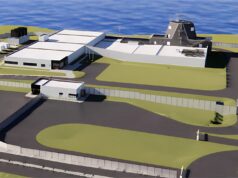
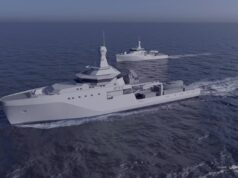
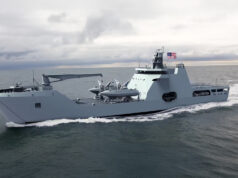
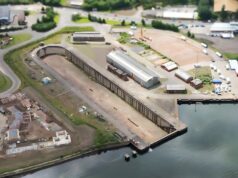
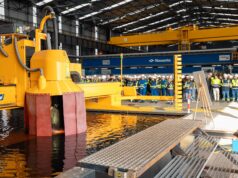
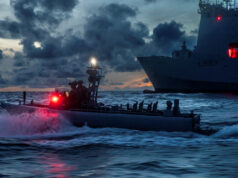
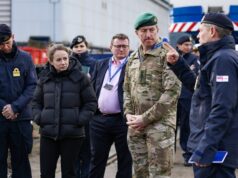

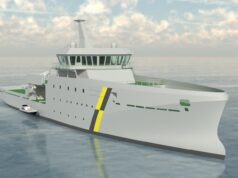
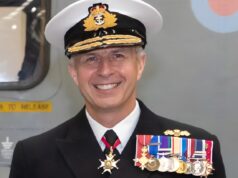

Will the Type 31s be used for CSG work? Their CAMM-MR would provide useful bulk for air defence work.
No official intention to procure CAMM-ER/MR at any point yet. Chatter in some army forums has suggested ER variant as well as the larger Giraffe S has been on the cards and may end up in inventory as a short term stop gap to some air defense shortfalls although nothing official as of yet.
The SDR is focusing heavily on air defences across the board so we’ll have to wait and see what happens, we are co-developing MR with Poland so it would make sense to end up procuring the missile later on. Besides the point, having a dual packed medium range SAM for naval vessel could give our up coming frigates a high level of area air defense and take a lot of strain off of the destroyer fleet, could have the T-31 packing 32 CAMM, 16 MR and the twin 40mms for a very potent defensive vessel – even if they only get 16 MK-41 cells that would still be practical, if the full 32 get bought they could carry 16 cruise missiles on top of that. The intention for T-31 was always to use them more as patrol frigates for second line roles, think Red Sea merchant escorts and Hormuz patrols, whilst T-26/45 can be retained for TAPS, CSG escorts and serious front line taskings – although as history shows second line vessels often end up alongside the capital ships and with a smaller fleet that is to be expected now regardless.
It would seem ridiculous to spend all that money and time developing a medium range SAM compatible with Sky Sabre to then not procure it. It would be a strong boost to GBAD without being incredibly expensive.
MR is years from being operational. -ER was developed by Italians.
Thought it got jointly developed between us but for the Italians?
MBDA UK own IP on CAMM so there would need to be some involvement from our end in that regard at least.
Yes, a few extra AAW enhanced T31s would give the fleet extra protection capabilities and could even add to any GBAD UK network as picket ships. Or give the AAW to the 5 current T31s for starters! Also doable would to give the T45s two MK41s or an increase on the 24 CAMM to maybe 36-48 to maximise its potential.
BOOM! from George.
Totally agree.
Hi Daniele, must say I’m really pleased Mr Healey confirmed both carriers are safe from being cut.
Howsit mate.
Yes, a very nice read George. I think the two carriers and their F35Bs will be even more important if any of the UK’s land based airfields ever become inoperative in a conflict with maybe damaged runways, hangars etc. As Daniele said a little while back, the carriers are the two best airfields the UK has , even in isolation, with three Phalanx’s, ECM, decent radars and all the F35Bs. Have to laugh.. the best shorad/gbad (or sbad?) is all at sea!
Carriers only work when they are the centrepiece of much bigger picture, but the RN has not been broken or distorted due to the carriers as many critics seem to state.
The woes of the services in general can be blamed on a decade of having to fund high intensity COIN operations and absolutely terrible procurement practices.
We have a defence budget heading towards £60 billion and yet the outputs are poor and getting worse due to abysmal waste on ever changing requirements, consultancy fees, private contracting and a lack of long term planning, save a penny today to spend a pound tomorrow ethos.
Whilst I totally agree with every word I am afraid I think at least one carrier will be gone within a decade. The run down of the military in the last quarter of a century is going to continue as the U.K. economy shrinks still further. Our GDP per capita ranks us at around 26th and falling and the nonsense of quoting ourselves as having the 6th largest economy means absolutely nothing as your average person feels and is becoming poorer when compared to other nations.
Until we have a Government and the country at large that recognises we need to make and sell more to support our spending I see little prospect of any real improvement. The fourth pillar of defence is economic strength.
The Government statement in 2034 will note we have today dispensed with some legacy equipment that is no longer fit for the challenges of modern warfare and saved £1Bn, which will be reinvested in new equipment when we can decide what that is.
I hope I am totally wrong.
Your assessment is somewhat skewed to try and fit your argument and all you are doing is adding to the narrative that we are becoming irrelevant. Not true. We are not 26th in the GDP per capita rankings, we are 20th (latest figures). Before you say that isn’t much better, the per Capita figure is misleading not the economy size, so total reverse to your argument. We sit at 20th just a smidge down from Germany, who are at 16th and who are the others in the Capita rating who are above us and therefore according to you, means they have more economic muscle and power, well top is Luxembourg, but above us we have a complete set of military powerhouses, from Singapore, Ireland, Iceland and many others similar. The US are 6th on the list, I don’t think the 5 above it or the 20 below combined could beat the US. Britain has a large population and a huge economy, those are what you need. The issues are do do with will, and poor governments making poor decisions, not us fading into obscurity. Stop moaning.
Who mentioned anything about fading into obscurity and if you want to compare our military to that of Luxembourg or Singapore then please feel free.
The facts are the U.K. is relatively declining as a military and economic power and GDP per capita does matter because it is good guide to the economic health of a country and ours has dropped in comparison to the US and others in the last decade or so. Our figures are also very much distorted by London, because the numbers for the rest of the country are even lower.
Why does this matter in terms of defence is because to spend more on defence you need consent from the majority of the population and that doesn’t happen when large numbers are relatively poor. Most of western Europe is going through the same thing but ours is more pronounced and we have struggled to recover from the 2008 financial crash.
Unless we can buck this economic malaise we are not going to be able to deliver the services including defence we all want. That’s not moaning but economic and political reality so get over it.
When it comes to economic and geopolitical power per capita GDP is completely irrelevant, China is ranked 72 and yet is without any doubt the second most powerful nation on the planet..the there nations with the highest per capita GDP are Luxembourg, Ireland and Singapore..who between them could not fight their way out of a wet paper bag…
What matters is total GDP as this gives a very good indication of total wealth available as well as population…and in total GDP we are the 6th wealthiest nation on the planet, we are one of only 5 meaningful nuclear powers on the planet ( with that ability to deliver a strategic warhead anywhere on the planet).
But you are right to the average persons wellbeing, GDP per person has more meaning…but not to geopolitical power and influence..individuals wellbeing is essentially meaningless in the in the game of great powers..unless it can be harnessed as a way to attack politically…very small very wealthy nations are great places to live..but tend to be geostrategic footballs of the great powers or places to ignore.
I don’t agree that total GDP is more important. If we take the case to an extreme double the population and keep GDP the same our everything would broken no public services would be able to cope. Go the otherway half the population wand keeping GDP the same our public services would be in incredible shape because the tax take would be high but with so few people to spend it on we could provide way better services. And from a geopolitical standpoint we’d be punching way above our weight easily able to afford 4% on defence. And with with GDP per capita being high and things like education infrastructure being much better than we have now due to spend per person being so much higher we’d be look upto as a nation and as a example of a well run state. No one looks on nations where the GDP per capita is rock bottom as a good example. And with a population that’s now much wealthier we’d have a queue of nations wanting to do business with us due to much higher levels of disposable income.
Infact there’s a very strong argument for the UK to embrace new technologies like self drive cars and trucks or other automation freeing up millions of workers to move to other sectors rather than keep adding people.
It’s very well documented the relationship between lower birth rates and GDP per capita rising. So it stands to logic that adding people through immigration instead of births will lower GDP per capita.
I’m not talking about the health of the nation or happiness, I’m talking about brute geopolitical power and for that you need total GDP not GDP per capita..for a lovely happy decent western county we want to live in we need GPD per capita..I’m just taking about military might..china has an awful GDP per capita but there is only one nation on earth that could actually take it on.
I would also like to point out that contrary to the people who keep insisting our county is shite, we actually have a very good GDP per capita..which is why a nation of only 60 million people has the 6th largest economy in the world..we are rich Andy anyone who says otherwise not being logical infact there are only three large counties with big populations that have a better gdp per population than we do and that’s the US , Germany and France…every other country with a larger GDP per capita is essentially a bit of a minnow.
Now I’m not advocating for a large population increase..we are small in landmass so cannot keep expanding our population..but out power comes from the fact we have both a good GDP per capita and have a large population which gives us a large total GDP..it’s that which indicates our power… not our GDP per capita as a measure…in the end population size is always a pretty good indicator of geopolitical power..china would wipe the floor with any European nation…even with a lot lower GDP per capita..but it’s a shite place to live.
Expat has just provided a great response but just to add that GDP is not a wealth index and does mask imbalances and weaknesses within an economy.
Our politicians therefore use GDP and not GDP per capita because simply adding more people notionally increases economic activity. This experiment has been going on for two decades and it hasn’t worked, which is why people are coming to realise we need innovation and productivity improvements to make a difference and to turn our economy around.
Aircraft carriers appear to be the new dreadnoughts, they’ve had their day, a determined enemy will put them on the bottom before you can say ‘drone swarm fodder’
Technology is moving through Moore’s law like a Californian shoplifter through a Target.
The argument has as much relevance as line or Collumn or for a better anology, crossing the T.
We might as well deploy longbowmen against the bear and dragon.
Tell that to the US and China, who can’t build them fast enough to supply their own demand for them.
Aurelius is correct. Every sentence of this article should be read as having “so long as hypersonic missiles and homing torpedoes are not used against the carrier” appended to it. Just because China and the US are building carriers as you say does not mean they have adjusted THEIR thinking to new realities.
Take the issue of support. The supposed allision of USNS Big Horn shows how easy it would be to turn ANY carrier into a floating tourist attraction. Call me crazy but such support ships won’t last long in the event of hostilities with peer militaries and the Houthis are demonstrating that non-peer militaries can, allegedly, manufacture such things as AAMs.
And they certainly demonstrated that the overall machine and ALL its working parts must be present and defensible or it stutters and dies. The Israelis always have to count on quick victories because their economy can’t keep up if the reserves are away from home for too long. And we know how Hezbollah have taken 1/4 of Israel’s ag production off line and the Houthis have shut down Eilat for a year and almost bankrupted the port.
THAT’s a disruption to maritime traffic about which no British carrier has done anything or will do anything. But the defense of Belize was magnificent, I grant you. 52 years ago.
Something is missing from this author’s analysis and I think it is an awareness of how advances in weaponry have vastly increased the threat to carriers. Think of how the Azerbaijanis were devastated by Azeri drones. Or of how Iran overwhelmed Israel’s anti-missile defenses. ($1B in ammo for one night and many penetrations.) Or of the monster Russian Poseidon torpedo with a nuclear warhead, a range of 10,000 km., and top speed of 115 mph. How close to a carrier does that monster have to get before it can generate a tidal wave that will sink a carrier like a toy boat?
I don’t want to say the author is unaware of this as he is surely not but I don’t see that awareness reflected in this article. In general, I think Western thinking now is premised on centuries of military dominance. The rest of the world finds the resulting arrogance and presumption repugnant and if they don’t they should.
Who are the US and Europeans, for example, to decide what government is acceptable in Serbia, Ukraine, Russia, S. Osssetia, Libya, Iraq, Iran, Afghanistan, Palestine, or Hungary? The US would use its resources better if it engineered color revolutions in Canada, Britain, France, Germany, Australia, and Jaceeendaland which crow about their “democracies” yet fanatically implement vicious censorship and judicial tyrannies. Britain has “disappeared” the two Skripals without the slightest wave of the hand in the direction of law or decency and Chermany wants to ban a major political party because . . . well, because it’s inconvenient.
The US itself awash in mile-high waves of MSM fairy tales and billionaire/Blackrock/JPM cash and is barely able to keep electoral fraud from installing communists. And name the Western country that’s not being destroyed from within with insane, treasonous third-world immigration. As Mark Twain observed in the 19th century, no less, about missionaries, “The best way to convert the heathen is to return home and save the ones you have.” The UK, no less than the US, should stay home and use its declining military power to defend national borders, not least by returning row boats and dinghies to the open ocean and sinking the vessels used by the NGO filth and seizing airliners flying in third-worlders from Bananaland. The US national political system is rotten to the core and unquestionably determined to destroy the country economically, socially, culturally, monetarily, and racially. By their works ye shall know them! (I read that somewhere.) But that is a subject for another day.
Suffice it to say, there is no pressing international problem that requires the “helpful” intervention of any American, Briton, Frenchman, German, or Nordic personage. They all need to take a good look in the mirror and resolve to mind their own beeswax and to live not by lies.
Right trash wall of textual diarrhoea 🤡💩 As expected.
Luckily you lot are going to be extinct in a very short period of time (historically speaking) and your deluded gibberings confined to the dustbin of history,,😄👌🏾
You could have saved yourself a lot of typing by just simply stating that you hate the west.
The trick is not getting into a war with people who can sink them. I mean you *can* grab a lion by the balls and twist but there would be a proportionate response especially in cold wars / modern wars where there’s more tit for tat and less – we hope – all out war. Waaa
How else can a naval force counter threats beyond the horizon?
Sea Control (ASW, air defence/AAW, and anti surface warfare) is a critically important mission for the carrier and the carrier group. It was during the Second World War and the Cold War, and it is again now in a renewed era of peer adversaries and contested seas. Sea Control is difficult to achieve without carrier aviation if operating any distance from friendly air bases.
The carrier puts fighters in close proximity to the assets or area to be defended without needing an excessive number of aircraft, and Geography, Mathematics, and Physics show that attacking aircraft carrying anti ship missiles are best dealt with using fighters to kill the archers, not the arrows. Airborne radar can see far beyond the radar horizon of shipborne ones and can detect low altitude targets at range, and fighters provide the means for interception and visual identification beyond the horizon, and engagement far beyond the range of shipborne missile systems.
Constant ASW helicopter operations are best supported by a large deck with multiple helicopters, as collocating them simplifies coordination, communications, and maintenance and support. Physics also shows that modern long range sonars fitted to ASW warships need to be used in conjunction with dipping sonar to achieve their potential – and vice versa. As with all such detection systems (radar/sonar/optical) there is trade off between range and resolution. The long range sonar provides long range detection, and the dipping sonar provides pinpoint accuracy.
Speed/Time/Distance considerations and radar/radar horizon matter!
See: https://www.arrse.co.uk/community/threads/1977-us-congress-report-the-us-sea-control-mission-carriers-needed-in-the-atlantic-for-air-defence-and-asw-due-to-maths-physics-geography.301236/
Carriers are fine to have, but a carriers not much good and our case two, without aircraft, neither has even half the aircraft they were designed to carry, nor decent defence to protect them, add it that we don’t have anywhere near enough ships that deploy with a carrier group, and have to rely heavily on other Nato countries, to supply ships, to travel with our carriers. Most of the British Navy ships have been sitting in port for years some since 2010 waiting for engine parts. For decades various UK governments have been cutting back on basics that each of the 3 services need to run effectively, and using antiqued methods of buying instead of allowing our military to buy of the shelf proven systems. Just so their “pals”,get the big contracts, and we then get sh1t service in return. No accountability at government lvl, for massive waste. And no danger of any of them losing their jobs, or going to jail for miss-management of Taxpayers money.
British navy????? Mmmmmmmm
Putinbots out in force today.
Well spotted. Certainly not a Brit.
Yup, you’re a damn eyetie, go back to where your fellow fascists live 💩👋🏾🤣
Few would argue that carrier borne airpower is unimportant. My concern from the announcement of the final design was that we had gone way beyond a larger replacement for the Invincibles. I was convinced that the costs would vastly exceed the original budget and that the F35 commitment would limit us to a single combat aircraft over whose development we would have no control. In the event, the build costs rose from £3.5b to £7.6b and the F35 has been an appallingly slow programme..
To date we have, after spending £16b + on carriers and aircraft, the capacity to operate @ a dozen combat aircraft, and these still only capable of launching a single type of bomb and AAMs similar to those the Harriers carried.
For around a third of the QE cost, Italy has acquired Cavour and Trieste,, able to operate F 35s in numbers similar to those we are likely to achieve for years to come.
The RN lobbied hard for the QEs, variously arguing we needed to generate sorties at similar levels to USN supercarriers( West) and that once committed, any government would have to find extra money for more escorts (Zambellas).
The first was untrue the second naive to the point of stupidity. The escort fleet is down to a handful of available ships.
To give Britain a carrier capability we actually needed could and should have been done far more cheaply. The original 30/40000 ton design, capable of carrying similar aircraft numbers to the Invincibles would have been perfectly adequate.
Budgets changed as the carriers were constructed, their price was also inflated by delays via politicians to keep people employed. And Cavour and Trieste were acquired years apart as single units, in a country whrre they haven’t murdered their shipbuilding industry
Also who are you to say what the Royal Navy needed as a replacement, all well and good saying something else would’ve been better in hindsight but we have what we have, make best use of them.
Cavour yes, Trieste, a flexible ship, is only commissioning this year, so the comparison is a fair one. I tried to show the thinking behind the size of the QEs and that it didn’t really make sense for the UK to devote such huge resources to deliver a capability enough for our needs. The hollowing out of so many other capabilities was in part a result of the commitment to the carriers.
But we have them now and given it is unlikely we will ever have enough F35s to make full use of them, need to think how we can get the most out of them. The 2017 plan to enhance the accommodation to support an amphibious role seemed to be sensible. With the permanent loss of the Albions, it should be reconsidered. Replacements for the Albions(MRSS) won’t be commissioned for years so doing this is perhaps the best way of protecting the QEs from future cuts.
I’d agree but it seems like they’re considered too important to do unescorted amphibious roles
The shortage of escorts is a problem, but it really affects any vessels that undertake amphibious operations. Albion, Bays, MRSS, QEs all need protection ( unless MRSS has a full self defence capability- unlikely)
So if the idea is to stay further offshore, the ability of a QE to launch numbers of Chinooks quickly and provide say a half squadron of F35s for CAP, might reduce the risk of sea to shore landings.
It may be that the RN are still hoping to fill both carriers with F35 and UCAVs to keep them both in a strike role. I suspect that won’t happen quickly. So a temporary change of role could bridge that gap.
Cavour is a very limited platform in reality, it will only ever hold one squadron of F35 and four rotor at max stretch we know that the QEs can carry 50-60 aircraft So yes it’s a third of the price, but it’s also a third of the capability.
To lever this the UK really needs to invest in 4 F35b squadrons.
So true.
Putin’s invasion of the UK is underway aided by our brain dead politicians and the civil servants and judges Putin has bribed. The aircraft carriers are just assets he will acquire in the next year or two when the invaders show their colours. It’s not just the illegal migrants but the legal ones bought to the UK by our own government because of apparent software engineering and science teaching staff, as one wth a science PGCE and 39 year of writing software I can tell you I have had at least 3 responses a day saying that they are proceeding with others with more experience but due to the high number of applicants they can’t give feedback… Shortage my arse, but then it must be cheaper to have me unemployed and bring these migrants in than employ me…. Though god knows the wages on offer for software engineers are less than half what I earnt in 2000 and are falling by the month.
Unfortunately our employment model is dependent on migrant Labour, because we completely liberalised our employers laws, essentially so large companies could make more profit with exploitative labour practices or our government could get away with not paying for things.
Social care is the classic example..it’s a completely exploitative industry, that pays so far below minimum wage and has such more working practices that only cheap migrant Labour will work in it…they call it a skills mix but that’s bollox, it takes a few months on the job training to get a decent social care worker if they have the right temperament and mindset ( you need to care and have a good level of emotional intelligence and be willing to do hard unpleasant work..that has its rewards in human connections). The problem is the government wants it so cheap a normal family raising adult cannot do it….why..they don’t pay for travel time, they don’t pay travel expenses and they only want the staff working between 7.00-11.00 and then 7.00-11.00 at night which means you have to work from early morning and then to late at night to get a full days work..each case is around 15 mins..you don’t get paid if it takes longer and you don’t get paid to travel to the next case..so if in an hour you have 2 cases with 30mins travel you only get paid 30 mins in the hour…so although in theory your on min wage..you actually get 50% of min wage. Also they are generally on zero hours contracts so they are not even guaranteed their 50% of min wage..
So basically its shit and not worth doing.which is why we end up importing 300 thousand migrant social care workers and yet still have 150 thousand vacancies…
This country needs better employment rights, stronger laws on casual labour markets etc..dry up the demand for exploitated workers and our migration problem will go away. Yes they will say but it will increase unemployment..bollox will it there are 500,000 jobs in social care just sitting there waiting for British workers if we transform the industry.
good read Jonathan – that sounds just like NZ!
Seconded! J for PM!
Yes, if you’re a right trash looney, all your delusional ranting makes perfect sense.
Hopefully the Maori take back what is theirs and kick the melanin-deficient invaders out once and for all (though skin cancer is doing a good job in the meantime) ,,,🤣👌🏾
No wonder no-one wants to employ a bitter old fart like you. Boo hoo 😭
I agree with article but they’re much more useful on a global scale because really that’s the whole point of a carrier to project power where there’s no access to conventional airstrips.
So.lets keep them and use them properly not n situations where quite frankly there’s better more cost effective options.
good piece George – well written
Another common trash human belief, and what exactly are Britain’s “interests”? All you care about is money, western nations have to be erased from this planet
Well said ‘Che Guevera’s’ love child. 😉❤️✌️
Have you considered that it might be in our interests ‘not’ to be erased from this planet?
Hopefully long, long after yours.
Your Fascist utopia of Italy is shrinking so fast there won’t be any more white trash left in a century or less 🙏🏾😄👋🏾
Various studies have shown that if you “do” aircraft carriers, you might as well make them large.
A significant part of the cost relates to the command part of the ship.
Does fleet command have to be on the carrier?
Due to its size, one might as well.
But for those who comment on their vulnerability, I agree in one way – all of the eggs in the one basket.
Although not its original design criteria, this is why the much derided Type 82 turned out to be so useful.
Imagine all of the electromagnetic emissions from a carrier just because of its command function.
I suppose the cost equation dictates that this will be the way.,
Maybe, we need new “destroyer leader” type concept but on a fleet/task force level.
Point to add – the carrier will normally be the centre of attention as far as the enemy is concerned, another reason to separate the command function.
Not the way we run them.
Harrier should have stayed and been improved and the main strike package with f35 as overwatch.
They also needed to be nuclear powered and build in Poland to save enough build the support fleet.
What we have now is just a joke.